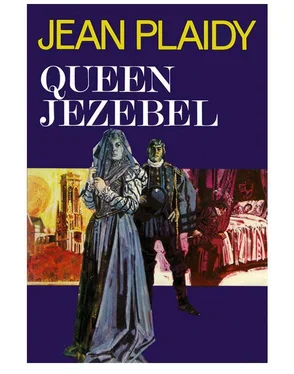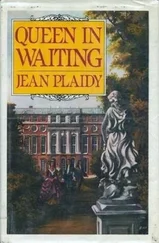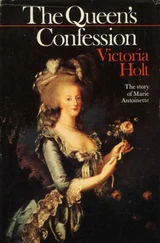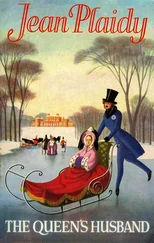Виктория Холт - Queen Jezebel
Здесь есть возможность читать онлайн «Виктория Холт - Queen Jezebel» весь текст электронной книги совершенно бесплатно (целиком полную версию без сокращений). В некоторых случаях можно слушать аудио, скачать через торрент в формате fb2 и присутствует краткое содержание. Жанр: Исторические любовные романы, на английском языке. Описание произведения, (предисловие) а так же отзывы посетителей доступны на портале библиотеки ЛибКат.
- Название:Queen Jezebel
- Автор:
- Жанр:
- Год:неизвестен
- ISBN:нет данных
- Рейтинг книги:4 / 5. Голосов: 1
-
Избранное:Добавить в избранное
- Отзывы:
-
Ваша оценка:
- 80
- 1
- 2
- 3
- 4
- 5
Queen Jezebel: краткое содержание, описание и аннотация
Предлагаем к чтению аннотацию, описание, краткое содержание или предисловие (зависит от того, что написал сам автор книги «Queen Jezebel»). Если вы не нашли необходимую информацию о книге — напишите в комментариях, мы постараемся отыскать её.
Queen Jezebel — читать онлайн бесплатно полную книгу (весь текст) целиком
Ниже представлен текст книги, разбитый по страницам. Система сохранения места последней прочитанной страницы, позволяет с удобством читать онлайн бесплатно книгу «Queen Jezebel», без необходимости каждый раз заново искать на чём Вы остановились. Поставьте закладку, и сможете в любой момент перейти на страницу, на которой закончили чтение.
Интервал:
Закладка:
The Queen Mother had ridden with the royal party, and she too made much of the newcomer, embracing him, telling him how she rejoiced to see him again, tenderly touching his black sleeve, while she lowered her eyes in assumed regret for his mother.
But what delighted Navarre more than the royal welcome were the ladies who rode with the Queen Mother. He had never before seen so much beauty, for every one of these ladies, seen singly, would have dazzled him with her charms. His half-veiled eyes studied them and from one of them—it seemed to him the most beautiful of them all—he received a smile of what he considered to be definite promise. She was a beautiful creature with fair hair and blue eyes. No other woman, he realized, had the grace and the elegance of these court beauties; and what a delightful change they made after the more homely charms of his dear little friends in Béam! The King of France rode beside him as they made their way into the capital.
‘It pleases me,’ said Charles, ‘to think that you will soon be my brother in truth.’
‘Your Majesty is gracious indeed:
‘You will find the city full of my subjects who have come from the four corners of France to see you married to my sister. Do not be afraid that we shall delay the wedding. The Cardinal of Bourbon is making difficulties. He is an old bigot. But I shall not allow him to waste much more of that time which belongs to you and my sister Margot.’
‘Thank you, Sire.’
‘You look well and sturdy,’ said the King enviously.
‘Ah, it is the life I lead. I spend much time on pleasure, so they say, but it would seem that it agrees with me.’
The King laughed. ‘My sister will be pleased with you.
‘I trust so, Sire.’
‘I hear,’ said Charles, ‘that you have little difficulty in pleasing women.’
‘I see that rumour concerning me has reached Paris.’ ‘Never fear. Parisians love such as you, brother.’
Was that true? Navarre was aware of glowering faces in the crowds that surged close to the cavalcade as it went through the streets.
‘Vive le Roi Charles!’ cried the people. And some added: ‘Vive le Roi Henri de Navarre!’ But not many, and there was a hiss or two to counteract the cheers.
‘There are many Guisards in the streets today,’ said Navarre.
‘There are all sorts,’ answered the King. ‘The followers of the Guise and the followers of my dear friend the Admiral mingle together now that you and my sister are to marry.’
‘It would seem as though the whole of France were gathered here . . . Huguenot and Catholic.
‘It would indeed seem so. I have heard that so many are in Paris that there is no room for them to sleep. The inns are full and at night they sprawl on the cobbles of the streets. It is all for love of you and Margot. My dear friend, the Admiral, will be filled with delight to see you here. He has a right good welcome waiting for you.’
Navarre smiled his pleasure while he glanced sideways at the King. Was the King, with his continual references to his dear friend the Admiral, trying to tell him that he was favouring the Huguenot cause after all? What of Catherine de’ Medici, who many believed had been responsible for the death of his mother? What did she intend for him?
He rarely concentrated on anything for long at a time, and as he saw the Louvre with its one arm stretching along the quay and the other at right angles, he looked up at its tower and narrow windows and remembered the young woman he had seen riding with the Queen Mother.
He said: ‘I noticed a very beautiful lady riding with Her Majesty, the Queen Mother. Her eyes were of a most dazzling blue, more blue than any eyes I have ever seen.’
The King laughed. ‘My sister’s eyes are black,’ he said.
‘The most beautiful eyes in France, so I have heard,’ said the bridgegroom. ‘Yet I wonder to whom the blue ones belonged.’
‘There is a lady in my mother’s Escadron who is remarkable for the colour of her eyes, and they are blue. I think, brother, that you refer to Charlotte de Sauves.’
‘Charlotte de Sauves,’ repeated Navarre.
‘My mother’s woman, and wife to the Baron de Sauves—our Secretary of State.’
Navarre smiled happily. He hoped to see a good deal of the owner of the blue eyes in the weeks to come, and it was rather pleasant to learn that she had a husband. Unmarried ladies sometimes made difficulties which it would be trying for a young bridegroom to overcome.
And as he came into the great hall and idly gazed through the windows at the Seine flowing peacefully by, as he mounted the great staircase of Henry the Second, he thought with extreme pleasure of Madame de Sauves.
On a Turkey rug in his apartments the King lay biting his fists.
He was greatly troubled and none dared approach him. Even his favourite falcons on their perches set up in this room could not delight him. His dogs slunk away from him; they, no less than his servants, detected the brooding madness in him. He was worried, and when he was worried it was usually because he was afraid. Sometimes when he stood at his window he seemed to hear a murmur of warning in the cries of the people which floated up to him. He felt that mischief was brewing and that he was threatened.
He could not trust his mother. What mischief did she plan? He watched the thickening body of his young wife with disquietude. His mother would never let the child live to stand in the way of her beloved Henry’s coming to the throne. And if she longed to see Anjou on the throne, what did she plot for her son Charles?
There were horrible silences in the streets, broken by sudden tumult. Of what did the huddled groups of people talk so earnestly? What did they mean—those skirmishes in taverns? It had been madness to bring Huguenots and Catholics into Paris; it was inviting trouble; it was preparing for bloodshed. He saw pictures of himself, a prisoner; he smelt the evil smell of dungeons; he saw his body tortured and his head severed from his body. He wanted to see blood flow then; he wanted his whips so that he could attack his dogs; and yet because some sanity remained to him he must remember the remorse which would follow such actions; he remembered the horror that was his when he looked on a beloved dog which he had beaten to death.
Someone had come into the room, and he was afraid to look up in case he should encounter his mother’s smile. They said she had secret keys to all the rooms in the palaces of France, and that often she would silently open a door and stand behind curtains, listening to state secrets, watching the women of her Escadron making love with the men she had chosen for them. In all his dreams, in all his fears, his mother played a prominent part.
‘Chariot, my little love.’
He gave a sob of joy, for it was not his mother who stood close to him, but Madeleine, his old nurse.
‘Madelon!’ he cried, as he used to when he was a little boy.
She took him into her arms. ‘My little one. What ails you, then? Tell Madelon.’
He grew calmer after a while. ‘It is all these people in the streets, Madelon. They should not be there. Not Huguenots and Catholics together. And it is I who have brought them here. That is what frightens me.’
‘It was not you. It was the others.’
He laughed. ‘That was what you always said when there was trouble and 4 was accused. “Oh, it was not my Charlot; it was Margot or one of his brothers.” ‘
‘But you were never one for mischief. You were my good boy.’
‘I am a King now, Nurse. How I wish I were a boy again, and that I could slip out of the Louvre, out of Paris, to some quiet spot with you and Marie and the dogs and my falcons and my little pied hawk to bring down the small birds for me. To escape from this . . . with you all. How happy I should be!’
Читать дальшеИнтервал:
Закладка:
Похожие книги на «Queen Jezebel»
Представляем Вашему вниманию похожие книги на «Queen Jezebel» списком для выбора. Мы отобрали схожую по названию и смыслу литературу в надежде предоставить читателям больше вариантов отыскать новые, интересные, ещё непрочитанные произведения.
Обсуждение, отзывы о книге «Queen Jezebel» и просто собственные мнения читателей. Оставьте ваши комментарии, напишите, что Вы думаете о произведении, его смысле или главных героях. Укажите что конкретно понравилось, а что нет, и почему Вы так считаете.












